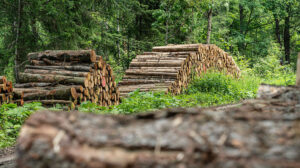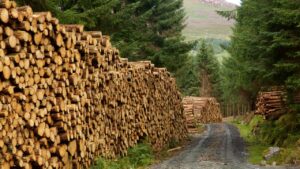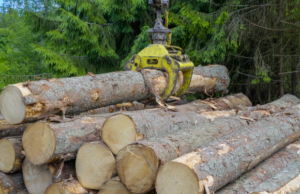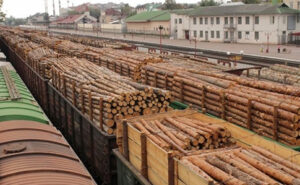
The state-owned enterprise “Forests of Ukraine” has completed auctions for the first quarter of 2026, during which almost all forest products were contracted, prices for hardwood species continued to rise, and prices for coniferous species stabilized, the press service of the state-owned enterprise reported.
“Forests of Ukraine” noted that the auctions were held for the first time under the zero quota for firewood exports introduced by the Cabinet of Ministers. However, in the process of competitive struggle for resources, market participants once again reached higher price levels.
Thus, 381,000 cubic meters were put up for quarterly auctions for the sale of industrial wood (PV), and almost 100% was contracted. Compared to the fourth quarter, the average price of firewood rose from UAH 2,300/cubic meter to UAH 2,600/cubic meter. The main reason was the rise in the price of hardwood from UAH 2,300/cubic meter to UAH 3,000/cubic meter. At the same time, the market value of softwood did not change significantly and amounted to UAH 2,400/cubic meter.
It is noted that the supply of firewood for sale by the State Enterprise “Forests of Ukraine” was distributed almost equally between quarterly and semi-annual (forward) auctions. The forward contracts for the first half of the year took place earlier: 100% of the resource (741 thousand cubic meters) was sold, with an average sale price of UAH 2.4 thousand/cubic meter.
“The tool for hedging price risks by concluding long-term contracts has once again proven its effectiveness. At least in the first quarter, products under semi-annual contracts for firewood will be slightly cheaper,” the state-owned enterprise stated.
Of the 775,000 cubic meters of round timber put up for sale at quarterly auctions, more than 99.5% was sold. The average selling price increased from UAH 6,800/cubic meter in the fourth quarter to UAH 7,300/cubic meter.
At the same time, “Forests of Ukraine” considers it incorrect to talk about a general increase in prices for commercial timber, since birch rose in price from UAH 5,700/cubic meter to UAH 7,600/cubic meter, oak from UAH 22,000/cubic meter to UAH 28,000/cubic meter, and ash from 8,000 UAH/cubic meter to 11,000 UAH/cubic meter. At the same time, alder has become cheaper, falling from 6,700 UAH/cubic meter to 5,900 UAH/cubic meter, and pine from 5,900 UAH/cubic meter to 5,600 UAH/cubic meter.
About 25% of the resource (654 thousand cubic meters) was put up for forward trading in commercial timber for the first half of the year. The average selling price at forward trading was slightly lower than the quarterly price and amounted to UAH 7.2 thousand/cubic meter. At the same time, while oak and ash were indeed contracted at prices lower than those at quarterly auctions, the situation was reversed for coniferous species, the state-owned enterprise noted.

According to the results of the auction, the state-owned enterprise “Forests of Ukraine” contracted 99% of the volume of round timber and firewood for the fourth quarter of this year, the press service of the SE reported on Telegram.
“Demand for wood continues to grow. (…) The average price of roundwood rose to UAH 6,800/cubic meter (in the third quarter — UAH 5,700/cubic meter, in the second — UAH 5,400/cubic meter). The average price of firewood for industrial use is UAH 2,300 per cubic meter (in the third quarter — UAH 1,800 per cubic meter, in the second — UAH 1,500 per cubic meter),” the report says.
As noted, the starting prices of the auctions were lower than the sales prices in the third quarter. The state-owned enterprise “Forests of Ukraine” tried to restrain price dynamics, but in conditions of free competition, the final prices are determined exclusively by demand.
To increase supply, Lisy Ukrainy put all available resources up for auction (except for firewood for the population, the social sector, and resources for the Armed Forces of Ukraine). A small percentage of products that buyers rejected were immediately put up for additional auction. Products for which there was no demand or which had a high price were put up for Dutch auction to determine the market price.
According to the state-owned enterprise, 1.5 million cubic meters of wood in the second half of the year was supplied to customers under forward contracts at a fixed price, meaning that processors were able to avoid the risk of rising product costs in advance.
In addition, during July-September, timber harvesting consistently exceeded 1 million cubic meters.
“As for increasing harvesting, this issue requires comprehensive solutions, most of which are currently beyond the competence of foresters,” said Forests of Ukraine, adding that the volume of main use logging over the past three years has remained virtually unchanged, within the range of 5.6-5.7 million cubic meters.

In January-June 2025, the state-owned enterprise “Forests of Ukraine” signed over 800 contracts through the Prozorro system for the harvesting of 5 million cubic meters of timber worth UAH 2.1 billion, the company’s press service reported on Telegram.
“Harvesting services account for the largest share of the company’s purchases. Traditionally, they were purchased under direct contracts. Last year, Forests of Ukraine began creating a transparent, open, and civilized timber harvesting market,” the state-owned company emphasized.
Lisy Ukrainy reminded that a number of entrepreneurs who were not used to working openly and did not accept the mechanism of public tenders resisted the reforms, but the procurement was successfully transferred to Prozorro. The state-owned enterprise demonstrated to businesses the advantages of concluding agreements through transparent, competitive auctions.
“The result is that thousands of workers are officially employed, contractors pay taxes to local budgets. There are more opportunities to monitor compliance with safety and working conditions. The opportunities for manipulation have been minimized—all contracts are published,” emphasized Lesy Ukrainy, adding that the formation of an efficient and competitive timber market is a guarantee that the company will fulfill its obligations to wood processors regarding timely deliveries of timber.

Lesy Ukrainy State Enterprise set another record and sold UAH 8.9 billion worth of unprocessed timber in April-June, according to the company’s CEO Yuriy Bolokhovets on his Facebook page.
“Lesy Ukrainy increased revenues to the state and local budgets by 40%! Tax payments in the first half of the year grew by more than UAH 1.7 billion compared to the same period in 2024,” he emphasized.
Bolochovets noted that the state-owned enterprise uses its after-tax profits to purchase new firefighting equipment (10 large fire trucks are planned in the near future), developing modern seed centers and infrastructure (forest roads, recreational areas, etc.), restoring forestry in de-occupied territories, and mechanizing harvesting (harvesters, forwarders, tractors, etc.).
He highly praised the effect of the six-month forward contracts, under which buyers selected all the timber, which made it possible to achieve 101% of the planned volume.
“Thanks to forward contracts, wood processors can reserve the volume of raw materials they need and fix the price. The company also benefits. The guarantee deposit, which is returned only after 97% of the contract has been fulfilled, motivates buyers to select the entire contracted volume of products. Next year, the share of forward contracts will be increased, with annual contracts planned,” he wrote.
In addition, Lesy Ukrainy has already shipped more than 95% of timber under quarterly contracts for the second quarter. Most of the non-fulfillments are the fault of buyers who either refuse to accept the goods or fail to pay on time.
The state-owned enterprise noted that it pursues a flexible policy on mutual settlements, realizing that producers may experience difficulties with working capital, as they do not immediately receive payment for the timber products they manufacture. However, the enterprise sometimes resorts to suspending deliveries until the buyer settles the debt, which to a certain extent affects the contract fulfillment rate.
“Overall, the situation on the timber market is still balanced. The rapid rise in the euro exchange rate has significantly strengthened the position of Ukrainian exporters, so the forecasts for the second half of the year are more than optimistic,” summarized the CEO of Lesy Ukrainy.

KYIV. July 2, 2025 – In the first half of 2025, the fulfillment rate of forward contracts on the Ukrainian Universal Exchange (UUE) reached 97.2%, which confirms the effectiveness of this instrument in the timber market. According to the exchange, out of 351 thousand cubic meters of unprocessed timber stipulated in the contracts, 341.16 thousand cubic meters were actually delivered.
The contracts were signed at the end of 2024 with the delivery period from January to June 2025. In total, sales were made under 55 forward agreements in more than ten regions of Ukraine.
According to Serhiy Gladkyi, Director of the Ukrainian Wholesale Exchange, such results demonstrate high discipline of bidders and trust in exchange mechanisms:
“Forward contracts allow market participants to plan logistics, production and finances six months in advance. The high level of execution confirms the effectiveness of long-term contracts,” he emphasized.
A key element of the system is the guarantee fee, which ensures the financial responsibility of the parties and minimizes the risks of default.
According to the exchange, this level of fulfillment is also evidence of the maturity of the market and the effectiveness of exchange instruments in the timber segment.
Forward contracts, Sergiy Gladkyy, TIMBER, UICE, Ukrainian Universal Exchange

Since the beginning of the year, exports of wood and wood products from Ukraine amounted to 1.42 million tons worth $671.8 million. Compared to the same period in 2024, when 1.34 million tons were exported for $593.9 million, the volume of exports increased by 81,700 tons, or 6%. At the same time, in monetary terms, there was an increase of $77.9 million, or 13%.
Pine products account for the largest share, 68.6%, indicating high demand for this type of wood on foreign markets. Spruce timber ranks second with 19%, followed by oak with 6.6% of the total volume.
At the same time, since the beginning of the year, customs authorities have detected violations amounting to over UAH 31.4 million.